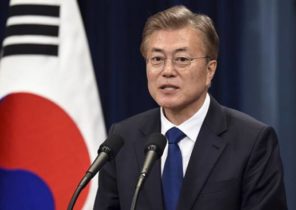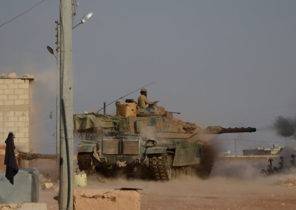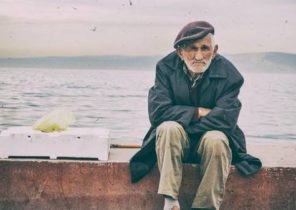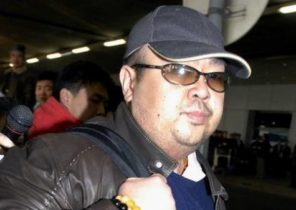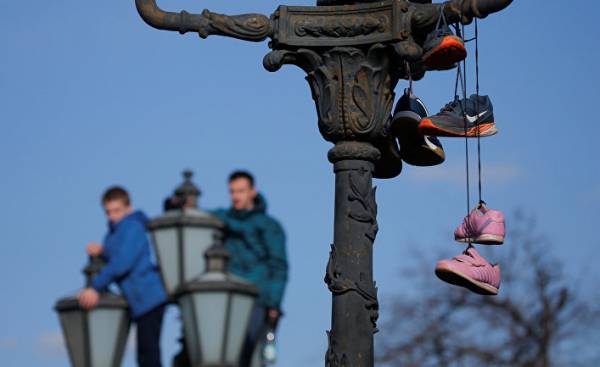
Demonstration on 26 March, quickly got the information in the “shadow” of a terrorist attack in St. Petersburg, which, in turn, was pushed into the background an American strike on Syria. Events quickly follow each other, their understanding of if and occurs, often with considerable delay. As a result, the society moves to the touch. We got this spring in a new political context — or nothing happened?
According to the sociologist, Professor at the Moscow higher school of social and economic Sciences (“Shoninki”) of Grigory Yudin, “some stories that now seem important, slowly, as a rotten tree will disappear and become irrelevant”. On the other hand, much of what today remains outside the focus of public attention, can be significant and even determine the future of the country. To separate one from the other, to understand the nature and the trajectory of society in a situation when it has become fashionable to say that worldwide democracy is experiencing a crisis — such are the goals of the “field school of democracy”, which will run this spring under the auspices of the InLiberty project near St. Petersburg. About this school, about whether justified hopes for a political activity of young people, and about why the government is beneficial to consider the citizens of the children, Gregory Yudin said in an interview with Radio Liberty.
— What is the “field school of democracy”, who is she and what will happen?
— Visiting the school of democracy was organized together with the project InLiberty, who did a lot of visiting schools in the last few years, stuffed on that hand. At first it was the main event for students, and then schools began to use such demand that they began to expand. This school, which we came up with them on democracy. We will attempt to seek answers to the current issues around democracy around the world, and in Russia these questions it is time to start to put. They are connected with talk about the crisis of democracy, its transformation, about the future.
— It will mostly be young people?
Yes. We are now engaged in the selection of participants, there is some incredible competition this time at this school. We hope that all will be able to maintain contact, but are unlikely to take all. There are people with very different backgrounds, experiences, aspirations, occupations and different ages too.
— Young people are now talking in connection with the recent demonstrations. It’s even a little bit funny: “suddenly” it became clear that young people not only in computer game playing, and interested in politics, and a demonstration can go. In your opinion, for them democracy is some kind of forbidden fruit in present-day Russia, or there is an understanding that this is a complicated mechanism, and the desire to understand how it works?
Over the last couple of weeks, starting with the demonstration on 26 March, we had such a cognitive shift, which, I think, not entirely justified. He began with the fact that a number of people came to the demonstration, found that there is a more youthful lineup than usual. This was immediately done by the global conclusion is that there are young people, which is terribly interested in politics or who has some of his preferences. What is the youth — no one has ever seen that this implies — it is unclear why all you can talk about this subject, as a youth, is unclear. I honestly wouldn’t jump to any conclusions about young people. The audience of these meetings was younger? Like Yes, although we have no accurate data. But this does not mean that there was some major subject which is called youth, and it will now solve all the problems. I recall that at the end of 2011 we already had the story of the “creative class”, who also “came” literally within a couple of weeks due to unexpected meetings. It began to grant absolutely incredible properties. So I wouldn’t jump to conclusions about young people.
— It turns out that the part of society that tries to comprehend what is happening, fuzzy ideas about yourself? Society itself doesn’t?
— In Russian society is quite high the protest energy. This is evident because a lot of aggression, discontent, passive resistance. But to give birth in something more active, consolidated and efficient this energy is hampered by the lack of a political entity. Who should be the next political entity? The answer to this question is generally no one. Viktor Tsoi at the time, sang: “the Next step is ours”. Who are the “we” is not clear yet. We see the same story with the youth: someone saw that the demonstrators are a bit younger, and decided that the next subject will be the youth. This is understandable attempts to find the subject, but I think that if we want to stay balanced, it is better not to take enthusiastically to each of these attempts.
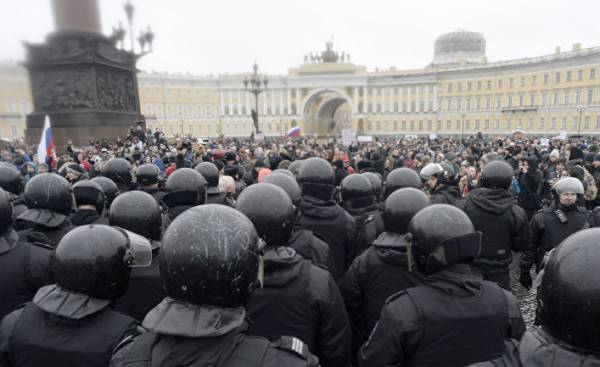 © AFP 2017, Olga MaltsevaАкция protest in St. Petersburg, 26 March
© AFP 2017, Olga MaltsevaАкция protest in St. Petersburg, 26 March
The opposition also engaged in the search of this subject? Bulk offers itself as the leader of those “we” you are talking about, what is still not clear who that “we” are. Those who oppose the government, do not understand and are looking for instinctively?
— Our society is doing, because we have a clear political entity, nobody can solve it. Navalny, in a sense, a leader ready for this future we. But, oddly enough, what will it be “we”, yet no one knows, including Bulk. And “we” will actually be to explain the Bulk of what he will continue to demand.
You say that potential protest activity is large, the democratic legitimacy of power, on the contrary, is not very large, and the need for representation of the citizens there. From this contradiction it is possible to go without a revolution?
— A good question. The revolution is generally very difficult to predict. But the greatest chance for a revolution always occurs where there is a clear resolve on the part of those in power — do not give up power under any circumstances and clearly show it. In Russia it is not yet in maximum extent, but the message that is sent from the top down, is clear: the power belongs to us, we used it to share with anyone not going, and you’ll have to endure. It is clear that a descent to do with it nothing is impossible, people can react differently. They can begin to justify such a situation can leave aside, as does the majority of our citizens, in their personal lives, because nothing can not be changed. And can cultivate anger and frustration. All this moves us, of course, the most radical scenarios.
You’ve just described the signals coming from the top down, and that signals from the bottom up? After the recent terrorist attack in St. Petersburg it drew attention to the fact that the number of conspiracy theories and even outright statements that the explosion, they say, cost of power, was unusually large. Well, social networking is just a small slice of society and probably not the most representative, but it is a symptom of the fact that the government is perceived as representing the citizens in General and a very capable against them. According to your observations, the government does not feel it, not want it to feel?
— I think, for many of those who run the country today, it’s not very important. You are right that they are held to democratic representation, they never sought to do so. I don’t think that they are very concerned about the emergence of the myth that they can be involved in the bombings or acts of terror. This, of course, serious accusations, but those accusations contains a belief in some Almighty power, in its ability to direct the game with impunity and indefinitely. I don’t think there is for them some kind of problem.
— And the system of legitimacy of power, what is it in this case? This is not a monarchy, that is legitimacy, more than this, God, not here. All democratic rituals formally met, but the true value of them, a growing number of citizens realize. What keeps this power?
On this model, which, in my opinion, the most correct to call the plebiscite. It contains some democratic elements, references to the fact that after all the sovereign is the people. But this assumes that the task of the people — only to endorse the policy of the authorities. And that’s all. It is not a simple representation of bottom-up: do the interests of citizens and their groups, then they start to representitaves higher and higher in the system. There is another way: on top of the signals that in the moment is important. The whole apparatus, which is now built, with the elections as an administrative procedure with public opinion polls, etc., allows you to maintain the illusion that there is some vast majority of the population, on whose support the regime and held.
Historically it’s something like Bonapartism? Napoleon, too, was all the time some plebiscites: all said “Yes, Yes”, and Parliament was not normal.
— There are many Parallels with Bonapartism, but some differences too. Of course, we live in a different era in terms of technology. The former regimes of this type was based rather on the fact that they are able to mobilize the masses in order that they in unison supported the ruler. Today there is this need. Moreover, if it was, I absolutely do not believe that today’s Russian elites would go that route. On the contrary, they set out to convince the inhabitants to stay home and not go out. The best support you can have a regime now, is to sit at home and nothing about the regime not to talk and not think.
But sometimes cause for staged rallies, like the recent rallies against terrorism.
— Yes, this is a great example of that, in my opinion, outrageous. Because he shows with what contempt the authorities are Russians and residents of large cities in particular. In the beginning of 2015, was an attack on the editor “Charlie Hebdo” in Paris, and all Paris just a day in millions of composition poured into the streets to show their solidarity against terrorism. What is the problem to organize a similar rally in Moscow or Saint-Petersburg? This is an absolutely European city, live here are the same people as in Paris. There would be no problem to millions of people without any coercion took to the streets, just had normal for people to go and serve it in the same way as in France — as a unifying rally, which was headed by leaders of different political forces who would take up arms and marched together at the head of the columns. There is no doubt that it would have collected a huge mass of people. What was done instead? People gave the order: you go here, you go here, here we’re going to pay for what little you stand up, take pictures and leave. This power does not need to be someone who took to the streets, moreover, it is very annoying.
— You talked about the illusion of the loyal majority. Judging by the polls, it is really an illusion — at least in terms of willingness to sacrifice the state’s own law. Data of a recent survey by the Levada center, 60 percent of Russians definitely or with a few reservations put their personal rights above the interests of the state. Opposing views in varying degrees, hold 34%, the gap is quite large. On the other hand, surveys show that most are willing to sacrifice the limitation of their rights in the name of security. It turns out some dissonance. For what is still a Russian majority for the rights and responsibilities of citizens or state paternalism?
— I have two comments. One relates to the polls. Specifically the data you are talking about does not show almost anything: they are 100% dependent on the specific wording of the questions they asked. You are sitting at home you come to or call the interviewer and said: yesterday in St. Petersburg was a terrorist attack, do you think we need security or not? What would you say? Of course, you need to! What are your other options? Or do you, for example, calling the interviewer, no terrorist act before it was not, and asked: do you think your personal rights are important or priority interests of the state? You say: of course rights are important, why not. Almost all such responses tell us very little. Some of the dynamics it makes sense to look at, but in General I did not attach these data to a large value.
The second thing you touched, really interesting — a reference to the law. After all, the balance between individual rights and state is actually not the key issue for democracy, it is only indirectly related. The key meaning of democracy is the willingness of its citizens to govern ourselves and together. Therefore, the main question of democracy — are we ready their collective political rights to implement, to fight for them and support them. While the question of what is more important — individual rights or the state, it is rather a question of liberalism. And today actually many Russians rightly believes that their personal rights are no special problems. We live in an autocratic regime, which, as nearly any such mode, really comes only to political rights. With other rights no major problems. What are our rights, except political, is strongly prejudiced?
— Many categories of civil servants may complain that they were banned overseas travel.
— Well, Yes. But they are easily mastered corporate spirit. And those who do not learn, they leave. Or trying to be smuggled out abroad. Yes, it’s a little frustrating, but they believe that these are the rules of the game are. But they have many other rights that they with this mode received.
But if you go back to the polls: it turns out that the empirical means to determine the level of maturity of the society, simply no? Only practice: will be going democratization or regime change, but we’ll see how the restructuring?
— I do not understand what is the meaning of such concepts as “level of maturity”. This concept assumes that society is the same body as the body of the child, which slowly develops, grows, and then becomes a young man and finally moves into adulthood. I don’t really understand the grounds for this kind of analogy: where we have been born? where adolescence? Where such a strange assumption?
But for this kind of constructions is based the current conservative political philosophy: Russia is not ready, anything’s better than revolution. Very same fashion, especially now, in 2017, to frighten the revolution. On the street in this kind of reasoning is just this logic: not ready, do not need again, as a hundred years ago, God forbid.
Yeah, I just don’t like this logic because it is very easy, it pushes you in the position of a child who somehow have to justify your simple action. That is why, if you go back to the story, which we began a conversation many young people as we see today in schools got aggressive demonstration that the school administration does not believe in the independence of students appeared the shaft of the rollers, which clearly reflect the dissatisfaction of teenagers that treat them without respect. Some Teens it’s good feels and understands. Why do we have to buy into the strange rhetoric of neutrality, underdevelopment and so on?
— Perhaps it derives from the formal approach to the history of Russia, in which the state invariably acts as a strict but wise father, supervising people and leading it forward, to all kinds of victories and achievements. You are one of the study’s authors, “What is past is necessary for the future of Russia”. There you write that in Russian society there are “other historical memory”, which exists parallel to the official historical policy and develops in the tissue of the living through family history in the first place. How this process is connected with what we say — with the desire of self-esteem, to a normal representation of citizens at the political level?
— I think that is a parallel and unidirectional processes. They are both related to the fact that the situation in which we live is characterized by an exceptional and growing “Gosudarstvennom”. The ideology with which we are dealing today, is minimal. Often said that it is conservatism, but conservatism is a special wing — reactionary, the whole idea is that he is trying to defend against the coming revolution. He has no positive content, no institutions to which he would be seriously committed. He’s just trying to crush any stirrings of self-initiative, because it sees them as the assertion of authority. Therefore, in its center is the state which must be protected. It is an ideology of fear that everything will crumble. There is nothing more there. This is quite a powerful emotion, but it is quite poor. We have a big country, it has rich life, just like it is to drain and this ideology is not easy. The same thing we see in the case history. We are offered a triumphant historical myth about the state, which for many centuries their winning streak went through the story. And this same state: there is no difference between the Russia of Ivan the terrible, Catherine the great Empire and the Soviet period.
— Count of St. Vladimir, as we not long ago talked about in connection with the anniversary of the death of this historic figure.
— I think even further you can dig. From a historical point of view, it is simply not serious. Throughout history on the territory which we are now speaking, there was a different state. What is common in ancient Russia, later the Russian Empire and the Soviet Union? A consequence of this historical myth, which we impose, is that from the fall any individual, family, private story. And people, of course, important to the greatness of the country, but it is important also, for example, who were their ancestors. And is becoming more important. According to the results of our study shows that this interest began to arise in the late 80-ies, when it became relatively safe to be interested in their family history, when people no longer hide your memories, hide files, on the contrary, began to seek information about what was previously not to say. When you start to learn his story, it turns out that some of your ancestors suffered from repression, others were fighting on different sides of the fronts during the civil war, and others suffered from the Imperial power, the fourth, on the contrary, have succeeded. There is another layer of relationship with history, which is parallel to the state myth that is imposed. The same with politics. It is impossible to seriously interested in Federal policy in the form in which it is trying to “sell” news channels, but people little by little there is interest in self-government. Slowly but awakens.
